连词复习
图片预览
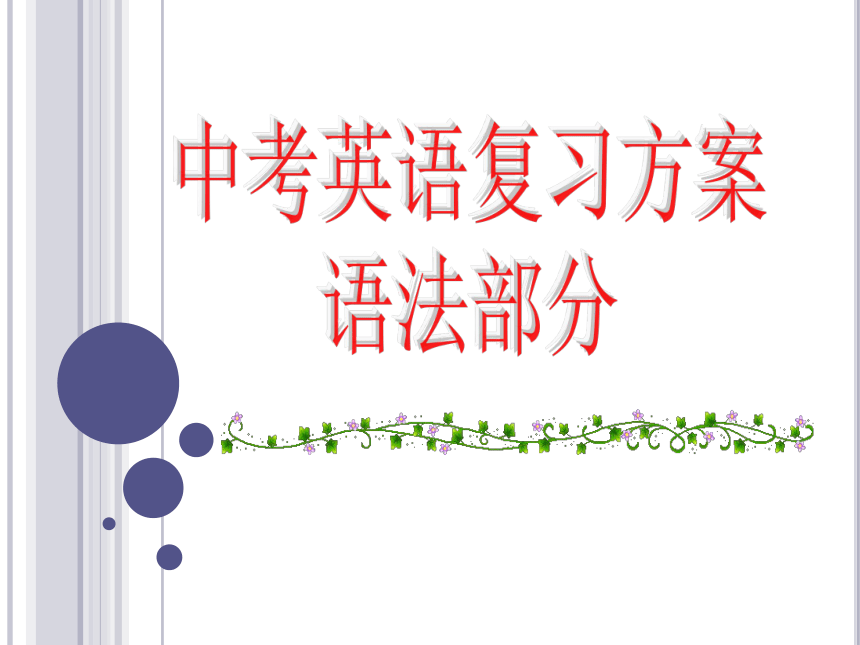
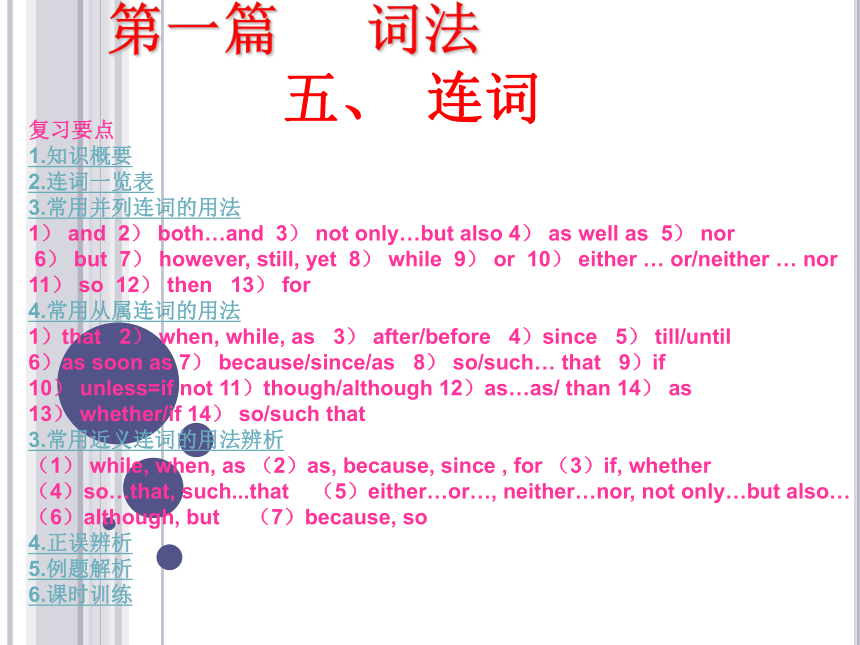
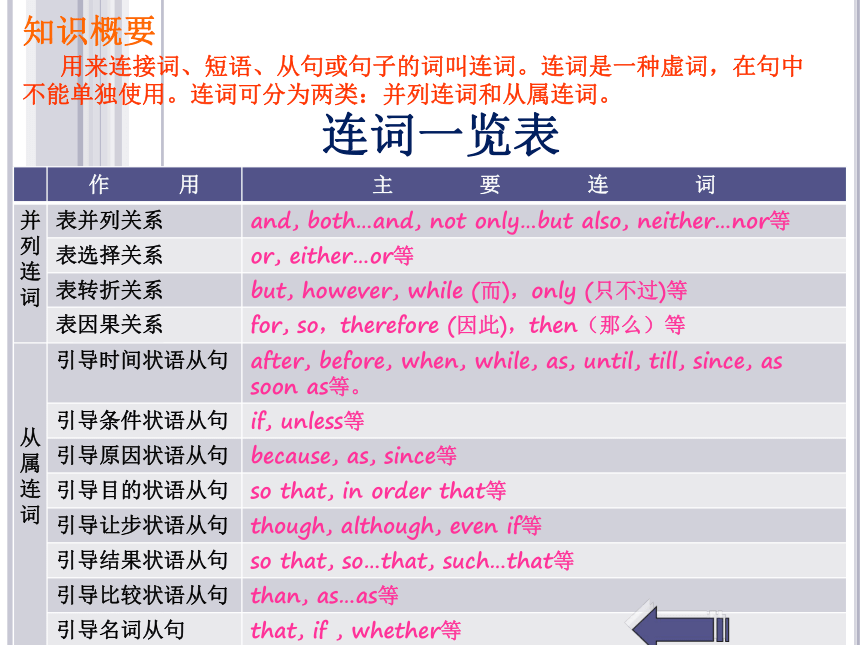
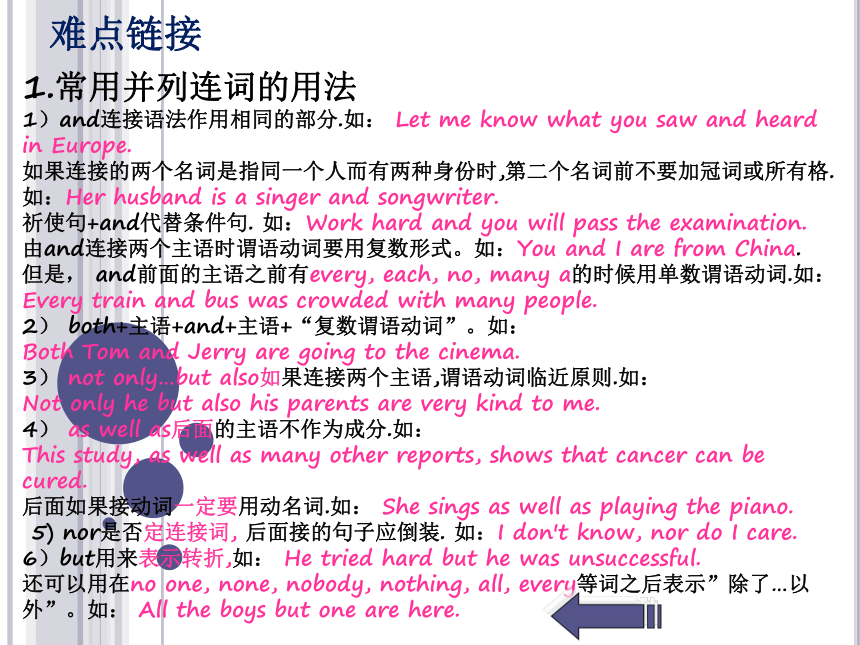
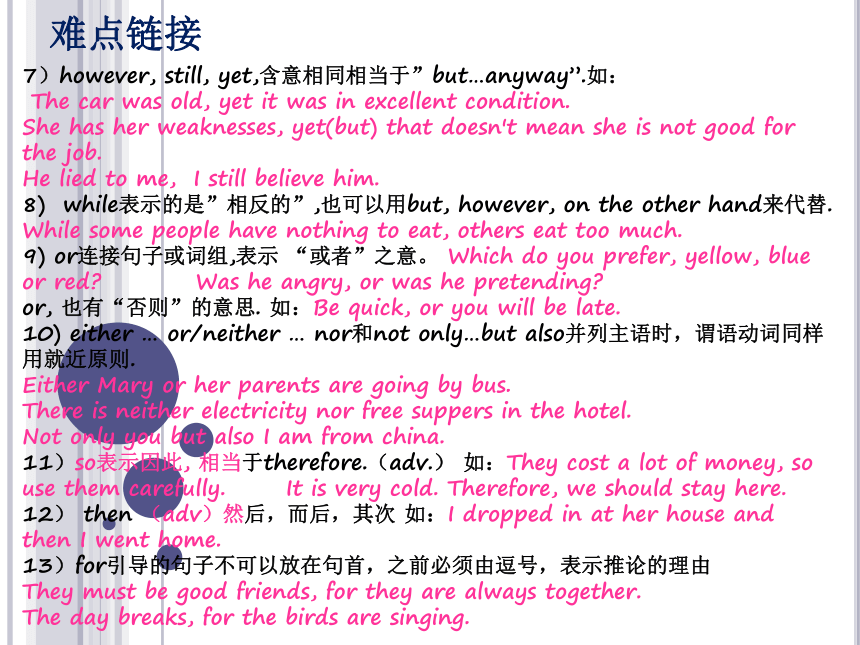
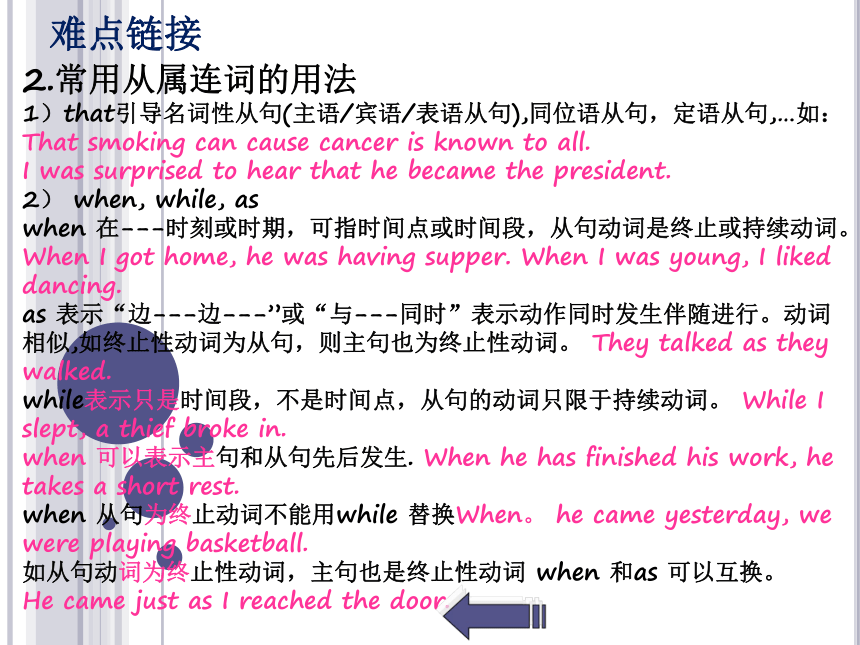
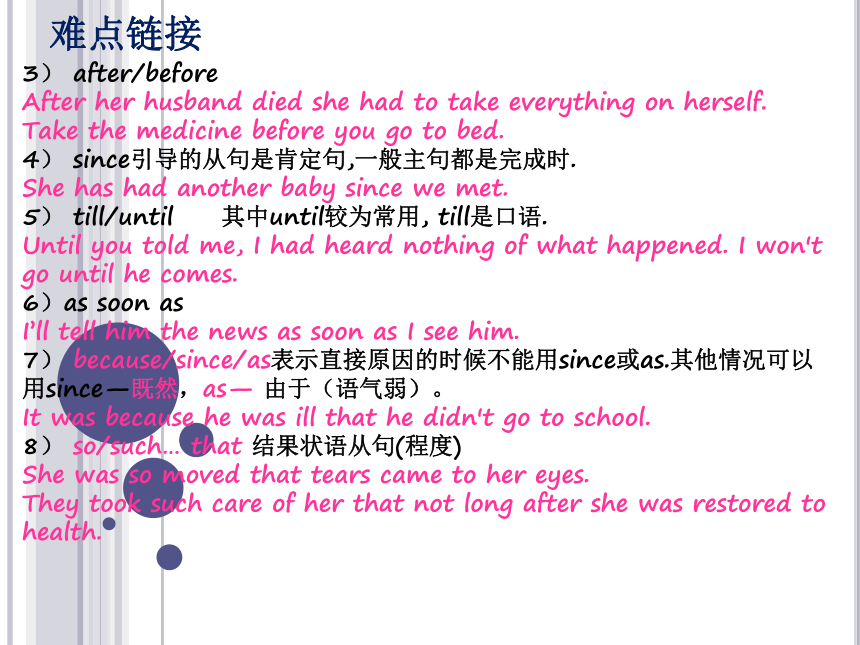
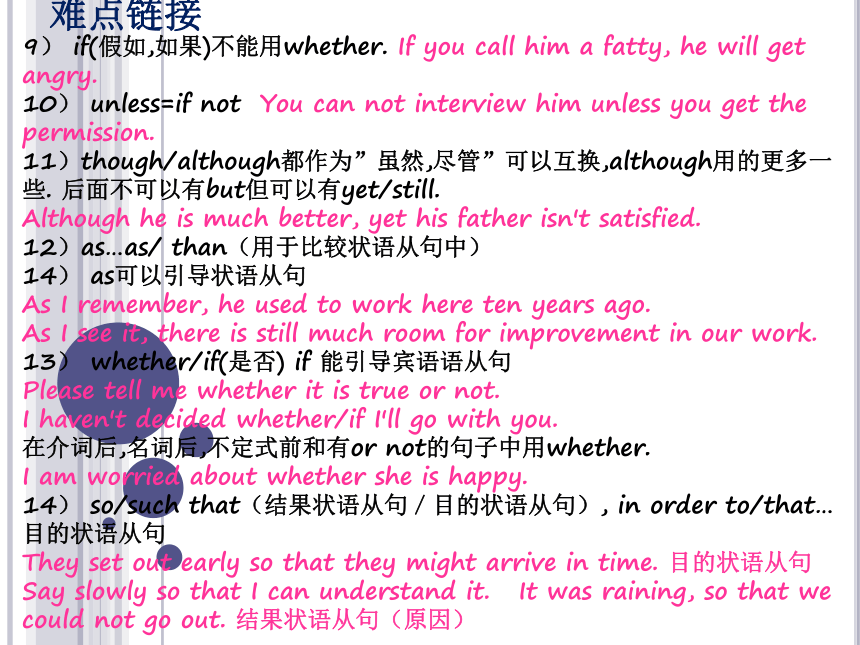
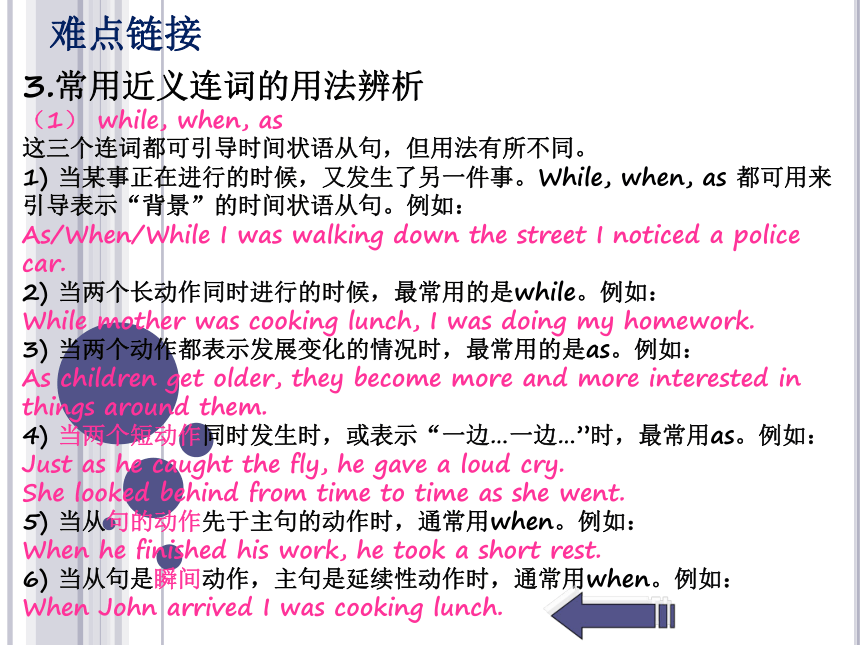
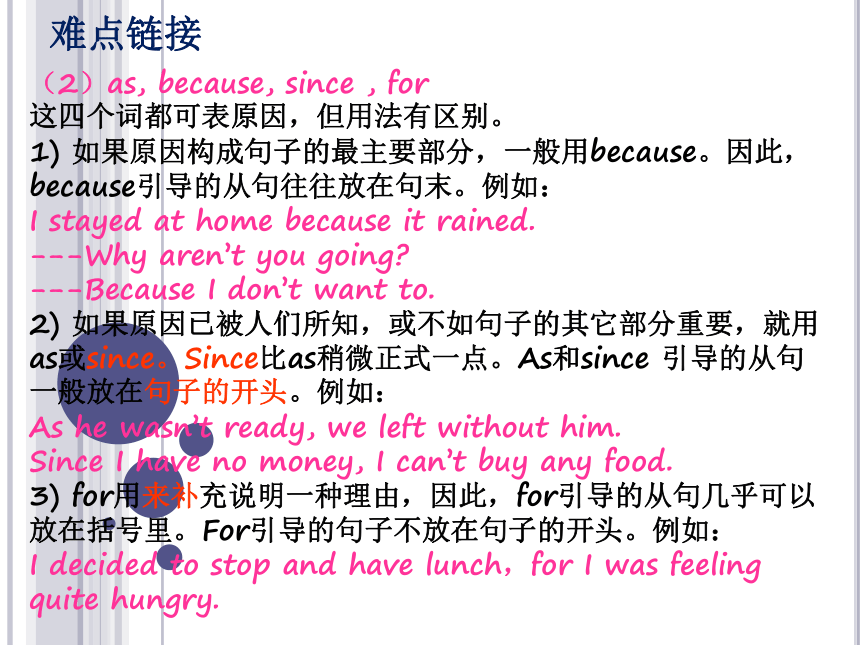
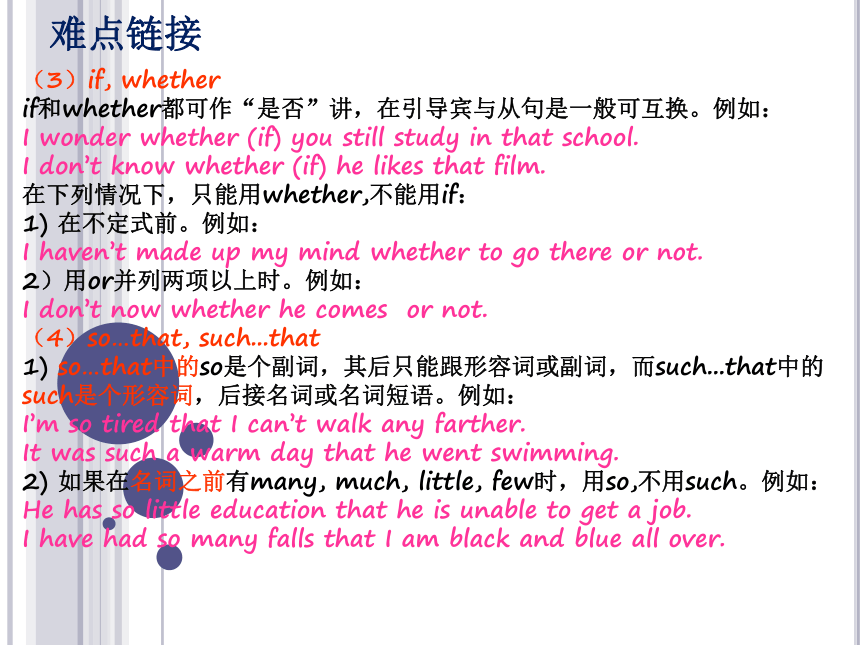
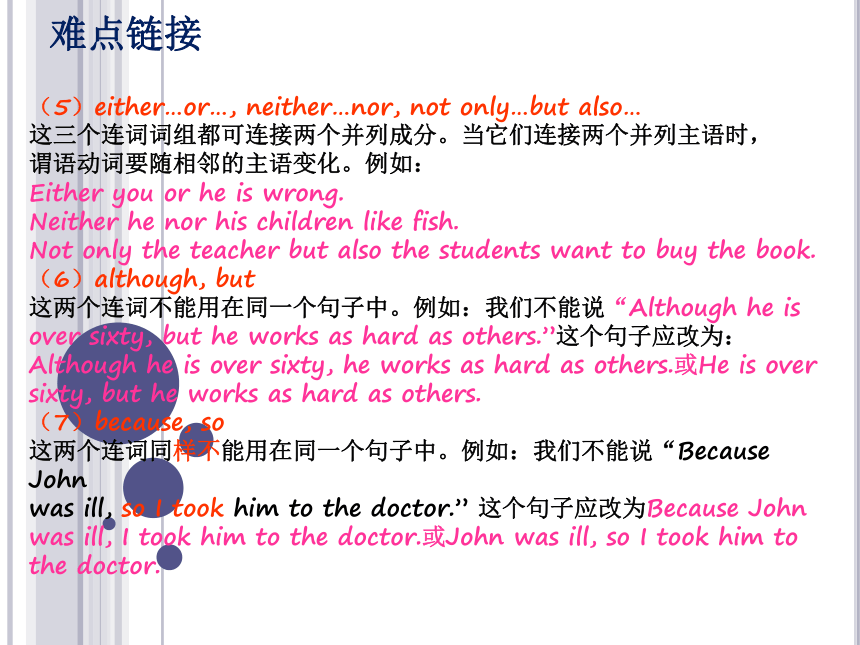
文档简介
课件30张PPT。中考英语复习方案
语法部分第一篇 词法
五、 连词
复习要点
1.知识概要
2.连词一览表
3.常用并列连词的用法
1) and 2) both…and 3) not only…but also 4) as well as 5) nor
6) but 7) however, still, yet 8) while 9) or 10) either … or/neither … nor
11) so 12) then 13) for
4.常用从属连词的用法
1)that 2) when, while, as 3) after/before 4)since 5) till/until
6)as soon as 7) because/since/as 8) so/such… that 9)if
10) unless=if not 11)though/although 12)as…as/ than 14) as
13) whether/if 14) so/such that
3.常用近义连词的用法辨析
(1) while, when, as (2)as, because, since , for (3)if, whether
(4)so…that, such...that (5)either…or…, neither…nor, not only…but also…
(6)although, but (7)because, so
4.正误辨析
5.例题解析
6.课时训练
知识概要
用来连接词、短语、从句或句子的词叫连词。连词是一种虚词,在句中不能单独使用。连词可分为两类:并列连词和从属连词。
连词一览表
难点链接1.常用并列连词的用法
1)and连接语法作用相同的部分.如: Let me know what you saw and heard in Europe.
如果连接的两个名词是指同一个人而有两种身份时,第二个名词前不要加冠词或所有格.
如:Her husband is a singer and songwriter.
祈使句+and代替条件句. 如:Work hard and you will pass the examination.
由and连接两个主语时谓语动词要用复数形式。如:You and I are from China.
但是, and前面的主语之前有every, each, no, many a的时候用单数谓语动词.如: Every train and bus was crowded with many people.
2) both+主语+and+主语+“复数谓语动词”。如:
Both Tom and Jerry are going to the cinema.?
3) not only…but also如果连接两个主语,谓语动词临近原则.如: Not only he but also his parents are very kind to me.?
4) as well as后面的主语不作为成分.如: This study, as well as many other reports, shows that cancer can be cured.
后面如果接动词一定要用动名词.如: She sings as well as playing the piano.
5) nor是否定连接词, 后面接的句子应倒装. 如:I don't know, nor do I care.
6)but用来表示转折,如: He tried hard but he was unsuccessful.
还可以用在no one, none, nobody, nothing, all, every等词之后表示”除了…以外”。如: All the boys but one are here.
难点链接7)however, still, yet,含意相同相当于”but…anyway”.如: ?The car was old, yet it was in excellent condition.
She has her weaknesses, yet(but) that doesn't mean she is not good for the job. He lied to me, I still believe him.?
8) while表示的是”相反的”,也可以用but, however, on the other hand来代替. While some people have nothing to eat, others eat too much.
9) or连接句子或词组,表示 “或者”之意。 Which do you prefer, yellow, blue or red? Was he angry, or was he pretending?
or, 也有“否则”的意思. 如:Be quick, or you will be late.
10) either … or/neither … nor和not only…but also并列主语时,谓语动词同样用就近原则. Either Mary or her parents are going by bus. There is neither electricity nor free suppers in the hotel.
Not only you but also I am from china.
11)so表示因此, 相当于therefore.(adv.) 如:They cost a lot of money, so use them carefully. It is very cold. Therefore, we should stay here.
12) then (adv)然后,而后,其次 如:I dropped in at her house and then I went home.
13)for引导的句子不可以放在句首,之前必须由逗号,表示推论的理由 They must be good friends, for they are always together. The day breaks, for the birds are singing.
难点链接2.常用从属连词的用法
1)that引导名词性从句(主语/宾语/表语从句),同位语从句,定语从句,…如:
That smoking can cause cancer is known to all. I was surprised to hear that he became the president.
2) when, while, as
when 在---时刻或时期,可指时间点或时间段,从句动词是终止或持续动词。 When I got home, he was having supper. When I was young, I liked dancing.
as 表示“边---边---”或“与---同时”表示动作同时发生伴随进行。动词相似,如终止性动词为从句,则主句也为终止性动词。 They talked as they walked.
while表示只是时间段,不是时间点,从句的动词只限于持续动词。 While I slept, a thief broke in.
when 可以表示主句和从句先后发生. When he has finished his work, he takes a short rest.
when 从句为终止动词不能用while 替换When。 he came yesterday, we were playing basketball.
如从句动词为终止性动词,主句也是终止性动词 when 和as 可以互换。 He came just as I reached the door.
难点链接3) after/before
After her husband died she had to take everything on herself.
Take the medicine before you go to bed.
4) since引导的从句是肯定句,一般主句都是完成时. She has had another baby since we met. 5) till/until 其中until较为常用, till是口语.
Until you told me, I had heard nothing of what happened. I won't go until he comes.
6)as soon as I’ll tell him the news as soon as I see him. 7) because/since/as表示直接原因的时候不能用since或as.其他情况可以用since—既然,as— 由于(语气弱)。 It was because he was ill that he didn't go to school.
8) so/such… that 结果状语从句(程度) She was so moved that tears came to her eyes. They took such care of her that not long after she was restored to health.
难点链接9) if(假如,如果)不能用whether. If you call him a fatty, he will get angry.
10) unless=if not You can not interview him unless you get the permission.
11)though/although都作为”虽然,尽管”可以互换,although用的更多一些. 后面不可以有but但可以有yet/still.
Although he is much better, yet his father isn't satisfied.
12)as…as/ than(用于比较状语从句中)
14) as可以引导状语从句 As I remember, he used to work here ten years ago. As I see it, there is still much room for improvement in our work.
13) whether/if(是否) if 能引导宾语语从句
Please tell me whether it is true or not. I haven't decided whether/if I'll go with you.
在介词后,名词后,不定式前和有or not的句子中用whether.
I am worried about whether she is happy.
14) so/such that(结果状语从句/目的状语从句), in order to/that…目的状语从句 They set out early so that they might arrive in time. 目的状语从句 Say slowly so that I can understand it. It was raining, so that we could not go out. 结果状语从句(原因)
难点链接3.常用近义连词的用法辨析
(1) while, when, as
这三个连词都可引导时间状语从句,但用法有所不同。
1) 当某事正在进行的时候,又发生了另一件事。While, when, as 都可用来引导表示“背景”的时间状语从句。例如:
As/When/While I was walking down the street I noticed a police car.
2) 当两个长动作同时进行的时候,最常用的是while。例如:
While mother was cooking lunch, I was doing my homework.
3) 当两个动作都表示发展变化的情况时,最常用的是as。例如:
As children get older, they become more and more interested in things around them.
4) 当两个短动作同时发生时,或表示“一边…一边…”时,最常用as。例如:
Just as he caught the fly, he gave a loud cry.
She looked behind from time to time as she went.
5) 当从句的动作先于主句的动作时,通常用when。例如:
When he finished his work, he took a short rest.
6) 当从句是瞬间动作,主句是延续性动作时,通常用when。例如:
When John arrived I was cooking lunch.
(2)as, because, since , for
这四个词都可表原因,但用法有区别。
1) 如果原因构成句子的最主要部分,一般用because。因此,because引导的从句往往放在句末。例如:
I stayed at home because it rained.
---Why aren’t you going?
---Because I don’t want to.
2) 如果原因已被人们所知,或不如句子的其它部分重要,就用as或since。Since比as稍微正式一点。As和since 引导的从句一般放在句子的开头。例如:
As he wasn’t ready, we left without him.
Since I have no money, I can’t buy any food.
3) for用来补充说明一种理由,因此,for引导的从句几乎可以放在括号里。For引导的句子不放在句子的开头。例如:
I decided to stop and have lunch,for I was feeling quite hungry.难点链接难点链接(3)if, whether
if和whether都可作“是否”讲,在引导宾与从句是一般可互换。例如:
I wonder whether (if) you still study in that school.
I don’t know whether (if) he likes that film.
在下列情况下,只能用whether,不能用if:
1) 在不定式前。例如:
I haven’t made up my mind whether to go there or not.
2)用or并列两项以上时。例如:
I don’t now whether he comes or not.
(4)so…that, such...that
1) so…that中的so是个副词,其后只能跟形容词或副词,而such...that中的such是个形容词,后接名词或名词短语。例如:
I’m so tired that I can’t walk any farther.
It was such a warm day that he went swimming.
2) 如果在名词之前有many, much, little, few时,用so,不用such。例如:
He has so little education that he is unable to get a job.
I have had so many falls that I am black and blue all over.难点链接(5)either…or…, neither…nor, not only…but also…
这三个连词词组都可连接两个并列成分。当它们连接两个并列主语时,
谓语动词要随相邻的主语变化。例如:
Either you or he is wrong.
Neither he nor his children like fish.
Not only the teacher but also the students want to buy the book.
(6)although, but
这两个连词不能用在同一个句子中。例如:我们不能说“Although he is
over sixty, but he works as hard as others.”这个句子应改为:Although he is over sixty, he works as hard as others.或He is over sixty, but he works as hard as others.
(7)because, so
这两个连词同样不能用在同一个句子中。例如:我们不能说“Because John
was ill, so I took him to the doctor.” 这个句子应改为Because John was ill, I took him to the doctor.或John was ill, so I took him to the doctor.正误辨析1.[误] Both my parents are not here. They went to the concert just now.
[正] Neither of my parents is here. They went to the concert just now.
[析] 在英语中both一般用于肯定句中,如用于否定句中,其意义也不同于汉语,如:Both of us are not right. 在英语中应被理解为"我们俩不都对。"而Neither of us is right。 才能被理解为"我们俩无一正确"。?
2.[误] He or his parents has some tickets for the film.?
[正] He or his parents have some tickets for the film.?
[析] 由or 连接两主语时,谓语动词应与相临近的那一个主语保持一致。
3.[误] You should study hard, and you won't pass the exam.?
[正] You should study hard, or you won't pass the exam.?
[析] or作为连词,这里的意思为"否则"。又如:Hurry up, or you'll be late for school.
4.[误] Though he is poor, but he is ready to help others.?
[正] Though he is poor, he is ready to help others.?
[正] He is poor, but he is ready to help others.?
[析] "虽然……但是"是中文中的常用结构,但在英文中用了"虽然"则不要用"但是",用了"但是"则不能再用"虽然",二者只可用其一。?正误辨析5.[误] Either you or I are on duty.?
[正] Either you or I am on duty.?
[析] either…or 连接两个主语时,其谓语动词与相临近的一个主语相呼应,这也叫作就近原则。类似的用法还有or, neither… nor, not only…but also等。?
6.[误] Tom is our English teacher and teaching English in our school now.
[正]Tom is our English teacher and is teaching English in our school now.
[析] 并列句中常常在后面的句子中作一些省略,以免重复,但不是所有词都可作任意的省略的。当你连接的是两个系动词时,后面的那个系动词不可省略,也就是讲连接的部分不可省略。?
7.[误] My father likes swimming and to collect stamps.?
[正] My father likes swimming and collecting stamps.?
[析] 由并列连词连接的两个部分要保持相等的语法结构。如是动名词则都用动名词,如用不定式则都应用不定式,这是初学者要注意的一点。?
8.[误] My father is reading a newspaper, I am doing my homework.?
[正] My father is reading a newspaper while I am doing my homework. [析] 两个并列句中间不可用逗号连接,要用并列连词来连接。?正误辨析9.[误] My father asked me that if I wanted to learn how to drive.?
[正] My father asked me if I wanted to learn how to drive.?
[析] 宾语从句的连接词只能有一个不能重复使用。?
10.[误] We will go both to Beijing and Shanghai.?
[正] We will go to both Beijing and Shanghai.?
[析] 用both…and…作连接词时,其相连接的部分结构也要相同。?
11.[误] Not only Mary but also her brothers is going to dance.?
[正] Not only Mary but also her brothers are going to dance.?
[析] 由not only… but also…连接两个主语时,其重点在其后面的那一个主语,所以谓语形式应采用就近原则。?
12.[误] The teacher as well as his students are coming.?
[正] The teacher as well as his students is coming.?
[析] 由as well as 连接两个主语时,谓语动词与as well as 后面的名词无关,而与前面的名词相一致。?
13.[误] Tom does not swim nor play football.?
[正] Tom does not swim or play football.?
[析] nor主要用于连接句子的对等连词,如在否定句中连接某一部分时要用or, 但要注意句子的含意,如:This animal does not like a cow or a horse. 这个动物既不像牛也不像马。This animal does not like a cow but a horse. 这个动物不像牛而像马。?正误辨析14. [误] For there is no light in the classroom. The students must have gone home.
[正] The students must have gone home, for there is no light in the classroom.
[析] 由for引出的原因状语从句在使用时要注意不能将该从句置于句 首,而应置于主句之后,并在主句与从句之间加一逗号。更要注意的是because, as, since与for 4个表示原因的连词中because是因果关系,是最强的一个,而for是最弱的一个。有些语法书中干脆把for叫做并列连词
15.[误] My brother will pass the English exam is no question.?
[正] That my brother will pass the English exam is no question.?
[析] 主语从句的引导词that是不可省略的。这一点不要和宾语从句的引导词相提并论。
16.[误] This map will show you how will you get to the hotel.?
[正] This map will show you how you will get to the hotel.?
[析] 名词性从句作宾语从句使用时,最重要的一点是要用陈述语句。特别要注意的是那些使用双宾语的动词,如:tell, ask, show…?
17.[误] While the clock struck ten, all the lights went out.?
[正] When the clock struck ten, all the lights went out.?
[析] while是强调两个动作在同时进行中,如:While I am doing my homework, my father is reading a newspaper. 而这里的when是"正当某某时刻","就在这一时间点上",其重点强调在某一特定时刻某动作的发生。?
正误辨析18. [误] While I was walking along the street yesterday, I met an old friend.? [正] When I was walking along the street yesterday, I met an old friend. [析] 这里用when表达在一个动作的进行中,另一个动作突然发生了。正在进行的动作用一进行时态,而突然发生的动作用一般时态。?
19.[误] While I heard the bad news I felt sad.?
[正] When I heard the bad news, I felt sad.?
[析] while不能表达一点儿的时间,即瞬时某一时间点。?
20.[误] After school some students play football, or others go to the library.
[正] After school some students play football, while others go to the library.
[析] while在此处意为"而,然而"。?
21.[误] She sang when she walked along the dark street.?
[正] She sang as she walked along the dark street.?
[析] as用于句中时,其要点是强调两个动作的同时进行。这里用when虽然不能讲是语法上的错误,但则看不出来小女孩因独自走黑暗的街道因害怕而唱歌的心情。22.[误] I finished my homework until twelve o'clock last night.?
[正] I didn't finished my homework until twelve o'clock last night.?
[正] I did my homework until twelve o'clock last night.?
[析] until用在句中时其含义是某一动作一直持续到某时结束,那么句中的动词则一定要用持续性动词,如果要用瞬间,或截止性动词时一定要用否定句式。因截止性动作的否定式应看作是持续性的动作。如离开leave是瞬间动作,因一出门即为离开了,而不离开则是长时间的。?
正误辨析23. [误] I have studied English when I was twelve.?
[正] I have studied English since I was twelve.?
[析] since引出的时间状语从句是表达了一个时间点,而这个时间点是主句动作的启始点,所以主句一般要用完成时态。?
24.[误] Because he didn't study hard, so he didn't pass the exam. ?
[正] He didn't pass the exam because he didn't study hard.?
[析] because 与 so在英文中两者不能并用的,只能在句中用其一。?
25.[误] He was such excited that he could not speak.?
[正] He was so excited that he could not speak.?
[析] so与such的用法可以分为四种情况,①用于单数可数名词之前,其格式是such+不定冠词+形容词+单数可数名词,如:It is such a beautiful book that every child likes it. 也可以用so, 其格式是so+形容词+不定冠词+单数可数名词,如:It was so beautiful a book that every child likes it. ②在不可数名词前或可数名词复数前这时只能用such, 如:It is such good weather that we want to swim. 又如:They are such good students that they can pass the exam easily. ③在few, little, much, many 这4个字前只能用so而不能用such, 如:I have so much money that I can buy everything I want. ④当that前只有形容词或副词时,这时只能用so, 如:She is so beautiful that every one likes her. He ran so fast that I couldn't keep up with him.?正误辨析26. [误] He got up earlier this morning so as to that he could catch the first bus.
[正] He got up earlier this morning so as to catch the first bus.?
[正] He got up so earlier that he could catch the first bus.?
[析] so…that与so that的用法有相同之处,那就是其后接从句,而so as to 其后要接不定式,即动词原形。这样的词组还有:in order to。?
27.[误] I want to buy same stamp that you have.?
[正] I want to buy the same stamp as you have.?
[析] the same…as (that)这是个固定用法,在same前的定冠词是不能少的。而the same…that意为"我要的就是那一个"。而the same…as为"要的是和……一样的东西"。
28.[误] Before I do not give you the answer, I'll ask you some questions.?
[正] Before I give you the answer, I'll ask you some questions.?
[析] 这种错误是由于受中文的影响。在中文中可以讲"我没给你答案前"。而英文用了before就不要再用否定句了。?
例题解析1? We bought Granny a present, ___ she didn't like it.?
A. but B. and C. or D. so ?
[答案] A. ?
[析] 由于句意的原因,应选择转折连词。?
2? Run quickly, ___ we'll miss the early train.?
A. and B. but C. so D. or ?
[答案] D. ?
[析] or这里应译为:否则。?
3? I'll give the book to him ___ he comes back.?
A. since B. as soon as C. before D. until ?
[答案] B. ?
[析] as soon as 引出的时间状语从句应用一般现在时表示将来要发生的动作。?
4? Don't cross the road ___ the light turns green.?
A. when B. while C. until D. as ?
[答案] C. ?
[析] until应译为"直到……才",因为前面的祈使句为否定句。又如:She did not go to bed until her mother came back. 应译为"直到她妈妈回来她才睡觉"。?例题解析5? Miss Gao has been a teacher ___ 1990.?
A. before B. after C. since D. in ?
[答案] C. ?
[析] 因为主句为完成时,所以应用 since表示该动作的启始点。?
6? - Which would you like better, tea ___ milk??
- Tea, please.?
A. but B. and C. or D. with ?
[答案] C. ?
[析] 在疑问句与否定句中应用or来表示一种选择。?
7? We love spring ___ there's beautiful flowers every where.?
A. though B. but C. or D. because ?
[答案] D. ?
[析] 因为这里表示的是因果关系。?
8? Please leave ___ 7∶00, then you'll be able to get ___ there earlier.?A. till, in B. from, / C. before, / D. behind, to ?
[答案] C. ?
[析] before为在7∶00之前离开。?例题解析9? The teacher didn't begin the lesson ___ all the students stopped talking.?A. until B. after C. if D. because ?
[答案] A. ?
[析] 这句应译为"直到所有的学生都停止讲话老师才开始上课"。因begin为瞬间动词,所以应用否定句。?
10? Betty didn't go to see the film yesterday ___ she was ill.?
A. but B. until C. if D. because ?
[答案] D. ?
[析] 这里是表示因果关系,所以应用because。因为她病了所以未去看电影。11? You must start right now, ___ you'll miss the train.?
A. for B. and C. so D. or ?
[答案] D. ?
[析] or译为"否则"。本句句意为:你必须马上走了,否则要赶不上火车了。12? ___ he is a child of six, he can read and write.?
A. Whose B. If C. Though D. Because ?
[答案] C. ?
[析] 这种状语从句在英语中称为让步状语从句,应译为:虽然他才是个6岁的孩子,他却可以读书和写字。?例题解析13? I like fish, ___ chicken, ___ eggs.?
A. and, and B. and, with C. /, and D. and, / ?
[答案] C. ?
[析] 在有若干个名词或动词出现时,每一个词之间只用逗号连接,只在最后两个词之间加and。如:The old man passed the street, went into a shop and bought some food。
14? Take this dictionary with you ___ you may use it in class.?
A. when B. in order to C. but D. so that ?
[答案] D. ?
[析] so that应译为"为的是"。本句句义为:带上字典,为的是在上课时可能有用。而in order to 其后应接动词不定式,如:Take this dictionary with you in order to use it in class。?
15? I hope ___ will be fine tomorrow.?
A. it B. what C. whether D. when ?
[答案] A. ?
[析] hope后接的是宾语从句,而且宾语从句中少主语,应用it来代替天气。?
16? ___ she was not well, I decided to go without her.?
A. Though B. As C. When D. Because of ?
[答案] B. ?
[析] as这里应译为"由于"。全句意为:由于她不舒服,我决定不带她去了。而because of 其后不能接从句只能接宾语。如: Because of the heavy rain, we decided not to go。例题解析17 My aunt bought me __many story books that I spent a lot of time ___them.
A. such…on B. such…in C. too…in D? so…on ?
[答案] D. ?
[析] 因many前只能用so来修饰,所以只能选择D选项。而spend…on something 为在某事上花费时间或钱。如:She spent a lot of money on her clothes。?
18? Mother was cooking ___ she ___ a knock at the door.?
A. when, listen to B. while, listened to?C. while, heard D. when, heard ?
[答案] D. ?
[析] when在这里应译为:就在那时,那一刻,那一瞬间。?
19? Speak slowly, ___ we can understand you.?
A. and B. or C. if D. because ?
[答案] A. ?
[析] and这里是并列连词,应译为:请讲慢些这样我们就会明白你的意思。20? You'll learn English well ___ you put your heart into it.?
A. if B. so C. until D. or ?
[答案] A. ?
[析] 本句译为:如果你将心放在学习上,你就会将英语学好。这里的语法现象是从句中用一般现在时表示将来。?例题解析21? I won't let you in ___ you show me your pass.?
A. until B. for C. since D. because ?
[答案] A. ?
22? She didn't go to school ___ she was ill.?
A. why B. because C. where D. but ?
[答案] B.
23. ---I like riding fast. It’s very exciting.
---Oh! You mustn’t do it like that, ________ it may have an accident.
A. and B. or C. so D. but
答案:B。该题考查的是并列连词的用法。答语的意思是“你不要那样做,否则会发生事故的。”在这四个并列连词中,只有or含有这样的意思,所以应选B。
4. John fell asleep ________ he was listening to the music.
A. after B. before C. while D. as soon as
答案:C。该题考查的是引导时间状语从句的常用从属连词的用法。本句的含义是“约翰在听音乐的时候睡着了。”表示在干某事时发生了某个事情” 通常用while。因此应选C。
?
课时训练单项填空
1. ---Will the foreigners have any problems talking with Chinese in 2008?
---I don’t think so. Now ______ the young ______ the old can speak some English.
A. either…or B. not only… but also C. neither…nor D. both…or
2. We didn’t catch the train _______ we left late.
A. so B. because C. but D. though
3. Tom failed in the exam again _______ he wanted to pass it very much.
A. if B. so C. though D. as
4. I won’t believe that the five-year-old boy can read five thousand words ______ I have tested him myself.
A. after B. when C. if D. until
5. The book was so interesting that he had read it for three hours ______ he realized it.
A. when B. until C. after D. before
BBCDD课时训练6. ---This dress was last year’s style.
---I think it still looks perfect ______ it has gone out this year.
A. so that B. even though C. as if D. ever since
7. Hurry up, _______ you will miss the train.
A. and B. so C. however D. or
8. The mountain was ______ steep _____ few people in our city reached the top.
A. so…as B. so…that C. as…as D. too…to
9. ---Do you remember our pleasant journey to Xi’an?
---Of course. I remember everything ______ it happened yesterday.
A. as soon as B. even though
C. rather than D. as if
10. ______ you can’t answer this question, we have to ask someone else for help.
A. Although B. While C. Whether D. SinceBDBDD课时训练11.Lucy and Lily are twins.Lucy likes playing basketball,_________Lily doesn't. ?
A.and B.but? C.as D.or?
12. The scientist knows two languages.?He can speak______English___French.
A.either,or B.neither,nor? C.both,and D.so,that?
13.He is rich_________unhappy.?
A.or B.and? C.so D.but?
14.Take a rest_________you finish the work.?
A.before B.after ?C.until D.while?
15.You can't pass the exam,______you study hard.?
A.if B.of ?C.unless D.and?
16._________our team tried best_________we failed.?
A.Though,but B.Because,so?
C.If,and D.Though,/?
17.Don't get off _______the bus stops.?
A.when B.after? C.until D.so?
BC DBCDC课时训练用适当的连词填空
1. ______ they are brothers, they don’t look like each other at all.
2. The dress was very expensive, ______ I didn’t buy it.
3. ---Do you know ______ I could pass the exam?
---Sorry, I’ve no idea.
4. Mr. Brown knows little Japanese, ______ he can’t understand the instructions on the bottle of the pills.
5. The war was over about a year ago, ______ the American soldiers in Iraq are still having a lot of trouble to deal with.
6. ---Is David at school today?
---No. He is at home _______ he has a bad cold.
7. _____ Lily _____ Lucy may go with you because one of them must stay at home.
8. Study hard, _____ you are sure to have a good result in the exam.
9. Please have a wash _______ you go to bed.
10. The twins have learned a lot ______ they came to China.so Although/ Though if/ whether sobutbecauseEither orandbeforesinceSee you next time!
语法部分第一篇 词法
五、 连词
复习要点
1.知识概要
2.连词一览表
3.常用并列连词的用法
1) and 2) both…and 3) not only…but also 4) as well as 5) nor
6) but 7) however, still, yet 8) while 9) or 10) either … or/neither … nor
11) so 12) then 13) for
4.常用从属连词的用法
1)that 2) when, while, as 3) after/before 4)since 5) till/until
6)as soon as 7) because/since/as 8) so/such… that 9)if
10) unless=if not 11)though/although 12)as…as/ than 14) as
13) whether/if 14) so/such that
3.常用近义连词的用法辨析
(1) while, when, as (2)as, because, since , for (3)if, whether
(4)so…that, such...that (5)either…or…, neither…nor, not only…but also…
(6)although, but (7)because, so
4.正误辨析
5.例题解析
6.课时训练
知识概要
用来连接词、短语、从句或句子的词叫连词。连词是一种虚词,在句中不能单独使用。连词可分为两类:并列连词和从属连词。
连词一览表
难点链接1.常用并列连词的用法
1)and连接语法作用相同的部分.如: Let me know what you saw and heard in Europe.
如果连接的两个名词是指同一个人而有两种身份时,第二个名词前不要加冠词或所有格.
如:Her husband is a singer and songwriter.
祈使句+and代替条件句. 如:Work hard and you will pass the examination.
由and连接两个主语时谓语动词要用复数形式。如:You and I are from China.
但是, and前面的主语之前有every, each, no, many a的时候用单数谓语动词.如: Every train and bus was crowded with many people.
2) both+主语+and+主语+“复数谓语动词”。如:
Both Tom and Jerry are going to the cinema.?
3) not only…but also如果连接两个主语,谓语动词临近原则.如: Not only he but also his parents are very kind to me.?
4) as well as后面的主语不作为成分.如: This study, as well as many other reports, shows that cancer can be cured.
后面如果接动词一定要用动名词.如: She sings as well as playing the piano.
5) nor是否定连接词, 后面接的句子应倒装. 如:I don't know, nor do I care.
6)but用来表示转折,如: He tried hard but he was unsuccessful.
还可以用在no one, none, nobody, nothing, all, every等词之后表示”除了…以外”。如: All the boys but one are here.
难点链接7)however, still, yet,含意相同相当于”but…anyway”.如: ?The car was old, yet it was in excellent condition.
She has her weaknesses, yet(but) that doesn't mean she is not good for the job. He lied to me, I still believe him.?
8) while表示的是”相反的”,也可以用but, however, on the other hand来代替. While some people have nothing to eat, others eat too much.
9) or连接句子或词组,表示 “或者”之意。 Which do you prefer, yellow, blue or red? Was he angry, or was he pretending?
or, 也有“否则”的意思. 如:Be quick, or you will be late.
10) either … or/neither … nor和not only…but also并列主语时,谓语动词同样用就近原则. Either Mary or her parents are going by bus. There is neither electricity nor free suppers in the hotel.
Not only you but also I am from china.
11)so表示因此, 相当于therefore.(adv.) 如:They cost a lot of money, so use them carefully. It is very cold. Therefore, we should stay here.
12) then (adv)然后,而后,其次 如:I dropped in at her house and then I went home.
13)for引导的句子不可以放在句首,之前必须由逗号,表示推论的理由 They must be good friends, for they are always together. The day breaks, for the birds are singing.
难点链接2.常用从属连词的用法
1)that引导名词性从句(主语/宾语/表语从句),同位语从句,定语从句,…如:
That smoking can cause cancer is known to all. I was surprised to hear that he became the president.
2) when, while, as
when 在---时刻或时期,可指时间点或时间段,从句动词是终止或持续动词。 When I got home, he was having supper. When I was young, I liked dancing.
as 表示“边---边---”或“与---同时”表示动作同时发生伴随进行。动词相似,如终止性动词为从句,则主句也为终止性动词。 They talked as they walked.
while表示只是时间段,不是时间点,从句的动词只限于持续动词。 While I slept, a thief broke in.
when 可以表示主句和从句先后发生. When he has finished his work, he takes a short rest.
when 从句为终止动词不能用while 替换When。 he came yesterday, we were playing basketball.
如从句动词为终止性动词,主句也是终止性动词 when 和as 可以互换。 He came just as I reached the door.
难点链接3) after/before
After her husband died she had to take everything on herself.
Take the medicine before you go to bed.
4) since引导的从句是肯定句,一般主句都是完成时. She has had another baby since we met. 5) till/until 其中until较为常用, till是口语.
Until you told me, I had heard nothing of what happened. I won't go until he comes.
6)as soon as I’ll tell him the news as soon as I see him. 7) because/since/as表示直接原因的时候不能用since或as.其他情况可以用since—既然,as— 由于(语气弱)。 It was because he was ill that he didn't go to school.
8) so/such… that 结果状语从句(程度) She was so moved that tears came to her eyes. They took such care of her that not long after she was restored to health.
难点链接9) if(假如,如果)不能用whether. If you call him a fatty, he will get angry.
10) unless=if not You can not interview him unless you get the permission.
11)though/although都作为”虽然,尽管”可以互换,although用的更多一些. 后面不可以有but但可以有yet/still.
Although he is much better, yet his father isn't satisfied.
12)as…as/ than(用于比较状语从句中)
14) as可以引导状语从句 As I remember, he used to work here ten years ago. As I see it, there is still much room for improvement in our work.
13) whether/if(是否) if 能引导宾语语从句
Please tell me whether it is true or not. I haven't decided whether/if I'll go with you.
在介词后,名词后,不定式前和有or not的句子中用whether.
I am worried about whether she is happy.
14) so/such that(结果状语从句/目的状语从句), in order to/that…目的状语从句 They set out early so that they might arrive in time. 目的状语从句 Say slowly so that I can understand it. It was raining, so that we could not go out. 结果状语从句(原因)
难点链接3.常用近义连词的用法辨析
(1) while, when, as
这三个连词都可引导时间状语从句,但用法有所不同。
1) 当某事正在进行的时候,又发生了另一件事。While, when, as 都可用来引导表示“背景”的时间状语从句。例如:
As/When/While I was walking down the street I noticed a police car.
2) 当两个长动作同时进行的时候,最常用的是while。例如:
While mother was cooking lunch, I was doing my homework.
3) 当两个动作都表示发展变化的情况时,最常用的是as。例如:
As children get older, they become more and more interested in things around them.
4) 当两个短动作同时发生时,或表示“一边…一边…”时,最常用as。例如:
Just as he caught the fly, he gave a loud cry.
She looked behind from time to time as she went.
5) 当从句的动作先于主句的动作时,通常用when。例如:
When he finished his work, he took a short rest.
6) 当从句是瞬间动作,主句是延续性动作时,通常用when。例如:
When John arrived I was cooking lunch.
(2)as, because, since , for
这四个词都可表原因,但用法有区别。
1) 如果原因构成句子的最主要部分,一般用because。因此,because引导的从句往往放在句末。例如:
I stayed at home because it rained.
---Why aren’t you going?
---Because I don’t want to.
2) 如果原因已被人们所知,或不如句子的其它部分重要,就用as或since。Since比as稍微正式一点。As和since 引导的从句一般放在句子的开头。例如:
As he wasn’t ready, we left without him.
Since I have no money, I can’t buy any food.
3) for用来补充说明一种理由,因此,for引导的从句几乎可以放在括号里。For引导的句子不放在句子的开头。例如:
I decided to stop and have lunch,for I was feeling quite hungry.难点链接难点链接(3)if, whether
if和whether都可作“是否”讲,在引导宾与从句是一般可互换。例如:
I wonder whether (if) you still study in that school.
I don’t know whether (if) he likes that film.
在下列情况下,只能用whether,不能用if:
1) 在不定式前。例如:
I haven’t made up my mind whether to go there or not.
2)用or并列两项以上时。例如:
I don’t now whether he comes or not.
(4)so…that, such...that
1) so…that中的so是个副词,其后只能跟形容词或副词,而such...that中的such是个形容词,后接名词或名词短语。例如:
I’m so tired that I can’t walk any farther.
It was such a warm day that he went swimming.
2) 如果在名词之前有many, much, little, few时,用so,不用such。例如:
He has so little education that he is unable to get a job.
I have had so many falls that I am black and blue all over.难点链接(5)either…or…, neither…nor, not only…but also…
这三个连词词组都可连接两个并列成分。当它们连接两个并列主语时,
谓语动词要随相邻的主语变化。例如:
Either you or he is wrong.
Neither he nor his children like fish.
Not only the teacher but also the students want to buy the book.
(6)although, but
这两个连词不能用在同一个句子中。例如:我们不能说“Although he is
over sixty, but he works as hard as others.”这个句子应改为:Although he is over sixty, he works as hard as others.或He is over sixty, but he works as hard as others.
(7)because, so
这两个连词同样不能用在同一个句子中。例如:我们不能说“Because John
was ill, so I took him to the doctor.” 这个句子应改为Because John was ill, I took him to the doctor.或John was ill, so I took him to the doctor.正误辨析1.[误] Both my parents are not here. They went to the concert just now.
[正] Neither of my parents is here. They went to the concert just now.
[析] 在英语中both一般用于肯定句中,如用于否定句中,其意义也不同于汉语,如:Both of us are not right. 在英语中应被理解为"我们俩不都对。"而Neither of us is right。 才能被理解为"我们俩无一正确"。?
2.[误] He or his parents has some tickets for the film.?
[正] He or his parents have some tickets for the film.?
[析] 由or 连接两主语时,谓语动词应与相临近的那一个主语保持一致。
3.[误] You should study hard, and you won't pass the exam.?
[正] You should study hard, or you won't pass the exam.?
[析] or作为连词,这里的意思为"否则"。又如:Hurry up, or you'll be late for school.
4.[误] Though he is poor, but he is ready to help others.?
[正] Though he is poor, he is ready to help others.?
[正] He is poor, but he is ready to help others.?
[析] "虽然……但是"是中文中的常用结构,但在英文中用了"虽然"则不要用"但是",用了"但是"则不能再用"虽然",二者只可用其一。?正误辨析5.[误] Either you or I are on duty.?
[正] Either you or I am on duty.?
[析] either…or 连接两个主语时,其谓语动词与相临近的一个主语相呼应,这也叫作就近原则。类似的用法还有or, neither… nor, not only…but also等。?
6.[误] Tom is our English teacher and teaching English in our school now.
[正]Tom is our English teacher and is teaching English in our school now.
[析] 并列句中常常在后面的句子中作一些省略,以免重复,但不是所有词都可作任意的省略的。当你连接的是两个系动词时,后面的那个系动词不可省略,也就是讲连接的部分不可省略。?
7.[误] My father likes swimming and to collect stamps.?
[正] My father likes swimming and collecting stamps.?
[析] 由并列连词连接的两个部分要保持相等的语法结构。如是动名词则都用动名词,如用不定式则都应用不定式,这是初学者要注意的一点。?
8.[误] My father is reading a newspaper, I am doing my homework.?
[正] My father is reading a newspaper while I am doing my homework. [析] 两个并列句中间不可用逗号连接,要用并列连词来连接。?正误辨析9.[误] My father asked me that if I wanted to learn how to drive.?
[正] My father asked me if I wanted to learn how to drive.?
[析] 宾语从句的连接词只能有一个不能重复使用。?
10.[误] We will go both to Beijing and Shanghai.?
[正] We will go to both Beijing and Shanghai.?
[析] 用both…and…作连接词时,其相连接的部分结构也要相同。?
11.[误] Not only Mary but also her brothers is going to dance.?
[正] Not only Mary but also her brothers are going to dance.?
[析] 由not only… but also…连接两个主语时,其重点在其后面的那一个主语,所以谓语形式应采用就近原则。?
12.[误] The teacher as well as his students are coming.?
[正] The teacher as well as his students is coming.?
[析] 由as well as 连接两个主语时,谓语动词与as well as 后面的名词无关,而与前面的名词相一致。?
13.[误] Tom does not swim nor play football.?
[正] Tom does not swim or play football.?
[析] nor主要用于连接句子的对等连词,如在否定句中连接某一部分时要用or, 但要注意句子的含意,如:This animal does not like a cow or a horse. 这个动物既不像牛也不像马。This animal does not like a cow but a horse. 这个动物不像牛而像马。?正误辨析14. [误] For there is no light in the classroom. The students must have gone home.
[正] The students must have gone home, for there is no light in the classroom.
[析] 由for引出的原因状语从句在使用时要注意不能将该从句置于句 首,而应置于主句之后,并在主句与从句之间加一逗号。更要注意的是because, as, since与for 4个表示原因的连词中because是因果关系,是最强的一个,而for是最弱的一个。有些语法书中干脆把for叫做并列连词
15.[误] My brother will pass the English exam is no question.?
[正] That my brother will pass the English exam is no question.?
[析] 主语从句的引导词that是不可省略的。这一点不要和宾语从句的引导词相提并论。
16.[误] This map will show you how will you get to the hotel.?
[正] This map will show you how you will get to the hotel.?
[析] 名词性从句作宾语从句使用时,最重要的一点是要用陈述语句。特别要注意的是那些使用双宾语的动词,如:tell, ask, show…?
17.[误] While the clock struck ten, all the lights went out.?
[正] When the clock struck ten, all the lights went out.?
[析] while是强调两个动作在同时进行中,如:While I am doing my homework, my father is reading a newspaper. 而这里的when是"正当某某时刻","就在这一时间点上",其重点强调在某一特定时刻某动作的发生。?
正误辨析18. [误] While I was walking along the street yesterday, I met an old friend.? [正] When I was walking along the street yesterday, I met an old friend. [析] 这里用when表达在一个动作的进行中,另一个动作突然发生了。正在进行的动作用一进行时态,而突然发生的动作用一般时态。?
19.[误] While I heard the bad news I felt sad.?
[正] When I heard the bad news, I felt sad.?
[析] while不能表达一点儿的时间,即瞬时某一时间点。?
20.[误] After school some students play football, or others go to the library.
[正] After school some students play football, while others go to the library.
[析] while在此处意为"而,然而"。?
21.[误] She sang when she walked along the dark street.?
[正] She sang as she walked along the dark street.?
[析] as用于句中时,其要点是强调两个动作的同时进行。这里用when虽然不能讲是语法上的错误,但则看不出来小女孩因独自走黑暗的街道因害怕而唱歌的心情。22.[误] I finished my homework until twelve o'clock last night.?
[正] I didn't finished my homework until twelve o'clock last night.?
[正] I did my homework until twelve o'clock last night.?
[析] until用在句中时其含义是某一动作一直持续到某时结束,那么句中的动词则一定要用持续性动词,如果要用瞬间,或截止性动词时一定要用否定句式。因截止性动作的否定式应看作是持续性的动作。如离开leave是瞬间动作,因一出门即为离开了,而不离开则是长时间的。?
正误辨析23. [误] I have studied English when I was twelve.?
[正] I have studied English since I was twelve.?
[析] since引出的时间状语从句是表达了一个时间点,而这个时间点是主句动作的启始点,所以主句一般要用完成时态。?
24.[误] Because he didn't study hard, so he didn't pass the exam. ?
[正] He didn't pass the exam because he didn't study hard.?
[析] because 与 so在英文中两者不能并用的,只能在句中用其一。?
25.[误] He was such excited that he could not speak.?
[正] He was so excited that he could not speak.?
[析] so与such的用法可以分为四种情况,①用于单数可数名词之前,其格式是such+不定冠词+形容词+单数可数名词,如:It is such a beautiful book that every child likes it. 也可以用so, 其格式是so+形容词+不定冠词+单数可数名词,如:It was so beautiful a book that every child likes it. ②在不可数名词前或可数名词复数前这时只能用such, 如:It is such good weather that we want to swim. 又如:They are such good students that they can pass the exam easily. ③在few, little, much, many 这4个字前只能用so而不能用such, 如:I have so much money that I can buy everything I want. ④当that前只有形容词或副词时,这时只能用so, 如:She is so beautiful that every one likes her. He ran so fast that I couldn't keep up with him.?正误辨析26. [误] He got up earlier this morning so as to that he could catch the first bus.
[正] He got up earlier this morning so as to catch the first bus.?
[正] He got up so earlier that he could catch the first bus.?
[析] so…that与so that的用法有相同之处,那就是其后接从句,而so as to 其后要接不定式,即动词原形。这样的词组还有:in order to。?
27.[误] I want to buy same stamp that you have.?
[正] I want to buy the same stamp as you have.?
[析] the same…as (that)这是个固定用法,在same前的定冠词是不能少的。而the same…that意为"我要的就是那一个"。而the same…as为"要的是和……一样的东西"。
28.[误] Before I do not give you the answer, I'll ask you some questions.?
[正] Before I give you the answer, I'll ask you some questions.?
[析] 这种错误是由于受中文的影响。在中文中可以讲"我没给你答案前"。而英文用了before就不要再用否定句了。?
例题解析1? We bought Granny a present, ___ she didn't like it.?
A. but B. and C. or D. so ?
[答案] A. ?
[析] 由于句意的原因,应选择转折连词。?
2? Run quickly, ___ we'll miss the early train.?
A. and B. but C. so D. or ?
[答案] D. ?
[析] or这里应译为:否则。?
3? I'll give the book to him ___ he comes back.?
A. since B. as soon as C. before D. until ?
[答案] B. ?
[析] as soon as 引出的时间状语从句应用一般现在时表示将来要发生的动作。?
4? Don't cross the road ___ the light turns green.?
A. when B. while C. until D. as ?
[答案] C. ?
[析] until应译为"直到……才",因为前面的祈使句为否定句。又如:She did not go to bed until her mother came back. 应译为"直到她妈妈回来她才睡觉"。?例题解析5? Miss Gao has been a teacher ___ 1990.?
A. before B. after C. since D. in ?
[答案] C. ?
[析] 因为主句为完成时,所以应用 since表示该动作的启始点。?
6? - Which would you like better, tea ___ milk??
- Tea, please.?
A. but B. and C. or D. with ?
[答案] C. ?
[析] 在疑问句与否定句中应用or来表示一种选择。?
7? We love spring ___ there's beautiful flowers every where.?
A. though B. but C. or D. because ?
[答案] D. ?
[析] 因为这里表示的是因果关系。?
8? Please leave ___ 7∶00, then you'll be able to get ___ there earlier.?A. till, in B. from, / C. before, / D. behind, to ?
[答案] C. ?
[析] before为在7∶00之前离开。?例题解析9? The teacher didn't begin the lesson ___ all the students stopped talking.?A. until B. after C. if D. because ?
[答案] A. ?
[析] 这句应译为"直到所有的学生都停止讲话老师才开始上课"。因begin为瞬间动词,所以应用否定句。?
10? Betty didn't go to see the film yesterday ___ she was ill.?
A. but B. until C. if D. because ?
[答案] D. ?
[析] 这里是表示因果关系,所以应用because。因为她病了所以未去看电影。11? You must start right now, ___ you'll miss the train.?
A. for B. and C. so D. or ?
[答案] D. ?
[析] or译为"否则"。本句句意为:你必须马上走了,否则要赶不上火车了。12? ___ he is a child of six, he can read and write.?
A. Whose B. If C. Though D. Because ?
[答案] C. ?
[析] 这种状语从句在英语中称为让步状语从句,应译为:虽然他才是个6岁的孩子,他却可以读书和写字。?例题解析13? I like fish, ___ chicken, ___ eggs.?
A. and, and B. and, with C. /, and D. and, / ?
[答案] C. ?
[析] 在有若干个名词或动词出现时,每一个词之间只用逗号连接,只在最后两个词之间加and。如:The old man passed the street, went into a shop and bought some food。
14? Take this dictionary with you ___ you may use it in class.?
A. when B. in order to C. but D. so that ?
[答案] D. ?
[析] so that应译为"为的是"。本句句义为:带上字典,为的是在上课时可能有用。而in order to 其后应接动词不定式,如:Take this dictionary with you in order to use it in class。?
15? I hope ___ will be fine tomorrow.?
A. it B. what C. whether D. when ?
[答案] A. ?
[析] hope后接的是宾语从句,而且宾语从句中少主语,应用it来代替天气。?
16? ___ she was not well, I decided to go without her.?
A. Though B. As C. When D. Because of ?
[答案] B. ?
[析] as这里应译为"由于"。全句意为:由于她不舒服,我决定不带她去了。而because of 其后不能接从句只能接宾语。如: Because of the heavy rain, we decided not to go。例题解析17 My aunt bought me __many story books that I spent a lot of time ___them.
A. such…on B. such…in C. too…in D? so…on ?
[答案] D. ?
[析] 因many前只能用so来修饰,所以只能选择D选项。而spend…on something 为在某事上花费时间或钱。如:She spent a lot of money on her clothes。?
18? Mother was cooking ___ she ___ a knock at the door.?
A. when, listen to B. while, listened to?C. while, heard D. when, heard ?
[答案] D. ?
[析] when在这里应译为:就在那时,那一刻,那一瞬间。?
19? Speak slowly, ___ we can understand you.?
A. and B. or C. if D. because ?
[答案] A. ?
[析] and这里是并列连词,应译为:请讲慢些这样我们就会明白你的意思。20? You'll learn English well ___ you put your heart into it.?
A. if B. so C. until D. or ?
[答案] A. ?
[析] 本句译为:如果你将心放在学习上,你就会将英语学好。这里的语法现象是从句中用一般现在时表示将来。?例题解析21? I won't let you in ___ you show me your pass.?
A. until B. for C. since D. because ?
[答案] A. ?
22? She didn't go to school ___ she was ill.?
A. why B. because C. where D. but ?
[答案] B.
23. ---I like riding fast. It’s very exciting.
---Oh! You mustn’t do it like that, ________ it may have an accident.
A. and B. or C. so D. but
答案:B。该题考查的是并列连词的用法。答语的意思是“你不要那样做,否则会发生事故的。”在这四个并列连词中,只有or含有这样的意思,所以应选B。
4. John fell asleep ________ he was listening to the music.
A. after B. before C. while D. as soon as
答案:C。该题考查的是引导时间状语从句的常用从属连词的用法。本句的含义是“约翰在听音乐的时候睡着了。”表示在干某事时发生了某个事情” 通常用while。因此应选C。
?
课时训练单项填空
1. ---Will the foreigners have any problems talking with Chinese in 2008?
---I don’t think so. Now ______ the young ______ the old can speak some English.
A. either…or B. not only… but also C. neither…nor D. both…or
2. We didn’t catch the train _______ we left late.
A. so B. because C. but D. though
3. Tom failed in the exam again _______ he wanted to pass it very much.
A. if B. so C. though D. as
4. I won’t believe that the five-year-old boy can read five thousand words ______ I have tested him myself.
A. after B. when C. if D. until
5. The book was so interesting that he had read it for three hours ______ he realized it.
A. when B. until C. after D. before
BBCDD课时训练6. ---This dress was last year’s style.
---I think it still looks perfect ______ it has gone out this year.
A. so that B. even though C. as if D. ever since
7. Hurry up, _______ you will miss the train.
A. and B. so C. however D. or
8. The mountain was ______ steep _____ few people in our city reached the top.
A. so…as B. so…that C. as…as D. too…to
9. ---Do you remember our pleasant journey to Xi’an?
---Of course. I remember everything ______ it happened yesterday.
A. as soon as B. even though
C. rather than D. as if
10. ______ you can’t answer this question, we have to ask someone else for help.
A. Although B. While C. Whether D. SinceBDBDD课时训练11.Lucy and Lily are twins.Lucy likes playing basketball,_________Lily doesn't. ?
A.and B.but? C.as D.or?
12. The scientist knows two languages.?He can speak______English___French.
A.either,or B.neither,nor? C.both,and D.so,that?
13.He is rich_________unhappy.?
A.or B.and? C.so D.but?
14.Take a rest_________you finish the work.?
A.before B.after ?C.until D.while?
15.You can't pass the exam,______you study hard.?
A.if B.of ?C.unless D.and?
16._________our team tried best_________we failed.?
A.Though,but B.Because,so?
C.If,and D.Though,/?
17.Don't get off _______the bus stops.?
A.when B.after? C.until D.so?
BC DBCDC课时训练用适当的连词填空
1. ______ they are brothers, they don’t look like each other at all.
2. The dress was very expensive, ______ I didn’t buy it.
3. ---Do you know ______ I could pass the exam?
---Sorry, I’ve no idea.
4. Mr. Brown knows little Japanese, ______ he can’t understand the instructions on the bottle of the pills.
5. The war was over about a year ago, ______ the American soldiers in Iraq are still having a lot of trouble to deal with.
6. ---Is David at school today?
---No. He is at home _______ he has a bad cold.
7. _____ Lily _____ Lucy may go with you because one of them must stay at home.
8. Study hard, _____ you are sure to have a good result in the exam.
9. Please have a wash _______ you go to bed.
10. The twins have learned a lot ______ they came to China.so Although/ Though if/ whether sobutbecauseEither orandbeforesinceSee you next time!
同课章节目录
- 词法
- 名词
- 动词和动词短语
- 动词语态
- 动词时态
- 助动词和情态动词
- 非谓语动词
- 冠词
- 代词
- 数词和量词
- 形容词副词及其比较等级
- 介词和介词短语
- 连词和感叹词
- 构词法
- 相似、相近词比较
- 句法
- 陈述句
- 一般疑问句和否定疑问句
- 特殊疑问句及选择疑问句
- 反意疑问句
- 存在句(There be句型)
- 宾语从句
- 定语从句
- 状语从句
- 主谓一致问题
- 简单句
- 并列句
- 复合句
- 主谓一致
- 主、表语从句
- 名词性从句
- 直接引语和间接引语
- 虚拟语气
- 感叹句
- 强调句
- 倒装句
- 祈使句
- 句子的成分
- 句子的分类
- 题型专区
- 单项选择部分
- 易错题
- 完形填空
- 阅读理解
- 词汇练习
- 听说训练
- 句型转换
- 补全对话
- 短文改错
- 翻译
- 书面表达
- 任务型阅读
- 语法填空
- 其他资料
